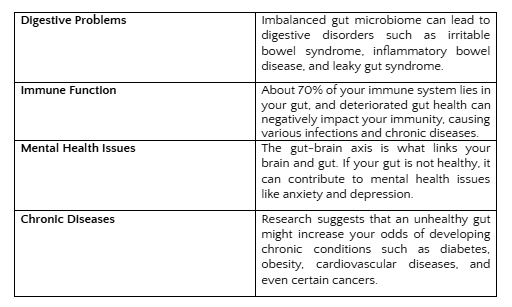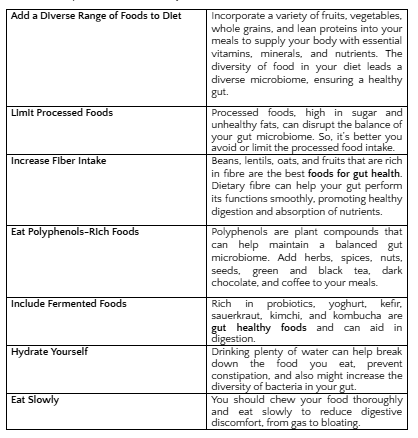Gut Health Secrets: How to Screen and Promote Gut Health?
Do you know that more than half of your immune system lies in your gastrointestinal tract? That being said, gut health is important to protect your overall health. But how can one ensure whether their gut is healthy? Well, your gut can be said to be healthy when it contains more good bacteria than harmful ones.
A recent survey by Country Delight and the Indian Dietetic Association discovered that 7 out of 10 people residing in urban India suffer from gut health or digestion-related problems. And out of them, 60% of people complain of experiencing digestive issues every week, while 12% suffer daily. With these figures in mind, how can you promote a healthier gut?
In this article, we'll dive into the secrets of gut health, exploring screening techniques and gut health improvement tips.
Understanding Gut Health and Gut Microbiome
Your gut is your gastrointestinal system, which includes your stomach, intestines, and colon. It’s responsible for digesting and absorbing nutrients from foods you eat and waste your body excretes.
Although there’s no specific definition for gut health, you can say your gut is healthy when it has a healthy gut microbiome and no or less tummy issues.
What’s meant by gut microbiome?
Trillions of bacteria, viruses, fungi, and other microorganisms live in your digestive tract. The gut microbiome is the collection of these bacteria, viruses, fungi, and other microorganisms. Some microorganisms can harm your body, but many are incredibly beneficial and even vital for your overall health.
Importance of Gut Health: How Can Gut Microbiome Affect Your Health?
Your gut’s primary functions are to break down and digest the foods you intake, absorb nutrients that support other vital bodily functions, and excrete waste. But your gut can perform all these functions only when it contains good bacteria (probiotics). An imbalanced gut microbiome (harmful bacteria outnumbering good bacteria) can lead to a variety of health issues.
So, how can an imbalanced gut microbiome affect your health? Since your gut is intricately connected to other organs and systems in your body, an unhealthy gut can affect you in the following ways:
The balance of your gut microbiome can be affected by stress, not having adequate sleep, smoking, drinking alcohol, inactive lifestyle, consuming ultra-processed food, and many other factors.
But how to recognise when you might have poor gut health? Look for the following signs:
- Digestive symptoms like gas, constipation, bloating, heartburn, or diarrhoea.
- Unintentional weight changes
- Frequently having infectious illnesses, like common cod
- Sleep disturbances or fatigue
- Skin irritation
- Autoimmune diseases
- Emotional health issues like high stress, anxiety, low mood
Tips to Promote a Healthy Gut
Is it possible to promote the health of your gut health? Yes, it is. You just need to adopt the following discussed lifestyle and diet changes to improve gut health:
Gut Health and Diet
Your gut microbiome balance is significantly influenced by what and how you eat. Follow these tips to maintain a healthy microbiome:
Poor sleep can have serious impacts on your gut health, which can further lead to more sleep issues. You should try to get 7 to 9 hours of quality sleep each night to support gut health.
Gut Health and Stress
Chronic stress can be very hard on your overall health, including your gut microbiome. It’s because frequent stressors stimulate your body to release certain hormones that can compromise your gut health.
So, you need to look after your mental wellbeing by managing your stress levels. Consider practising stress-reducing techniques like meditation, yoga, deep breathing, and mindfulness. In addition, it can help to exercise regularly, sleep restfully, get a massage, limit alcohol intake, and eat well.
Gut Health and Exercise
Regular physical activity can positively influence gut bacteria and stimulate your gut muscles to move digestive food content through your body. It’s advisable to engage in cardiovascular exercises like walking, cycling, or swimming for at least 30 minutes on most days of the week.
Gut Health and Breastfeeding
Breastfeeding is a good way to help your infant develop a healthy gut microbiome, providing them with the necessary antibodies and bacteria for long-term health.
Gut Health and Probiotic Supplements
Have you heard about the significance of probiotics for gut health? Probiotics are live bacteria that can benefit your gut and overall body functioning.
In addition to consuming a healthy diet, you can take. Probiotic supplements for optimal gut health. However, as a precaution, consider speaking to your dietician to determine what probiotic supplements are safe and might work.
Screening Your Gut Health
Are you experiencing some weird symptoms and are concerned about your gut health? If so, opt for gut health screening to gain insights into the state of your gut microbiome. The screening for gut health usually involves the following tests:
- Stool tests analyse the composition of bacteria in your gut to detect imbalances, the presence of pathogens, and levels of beneficial bacteria.
- Breath tests, mainly hydrogen and methane breath tests, can help diagnose bacterial overgrowth in your small intestine.
- Blood tests are performed to identify markers of inflammation and antibodies that suggest food intolerances or autoimmune responses related to your gut health.
- Gut barrier function tests are used to assess the permeability of your gut lining, helping to diagnose conditions like leaky gut syndrome.
Final Say
The human gut is a complex system. And it’s been researched that your gut microbiome can significantly affect your overall health, from your digestive system to your mental state. Adopting the discussed lifestyle and dietary changes can preserve your gut health while protecting your overall wellbeing.
Are you facing any gut issues? Reach out to gastroenterology specialists at Medanta for quick screening and appropriate treatment plans.




